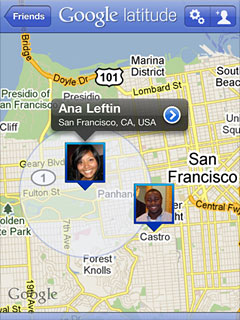
Launched in February of 2009, Latitude works similarly to Facebook by using the GPS of a BlackBerry, Android or Windows Mobile device to pinpoint users' positions on a map and share that information with friends. Privacy options are plentiful: have Latitude detect your exact location and automatically share it, manually enter your location by address or city, or hide your location entirely. (Though if you choose to do that last option, why bother using Latitude at all?)
Since launch, Google has introduced tie-in features like Google Talk Location Status, which shares Latitude locations with Google Talk or Gmail contacts and updates your status message with your current city as you move, and Google Public Location Badge, which shares a user's location publicly or on a blog or web site. Weeks ago, the company quietly killed its "experimental" Latitude Location Alerts feature, which made some of its 9 million active users uncomfortable when friends opted to get emails alerting them to nearby friends, sometimes down to the meter.
